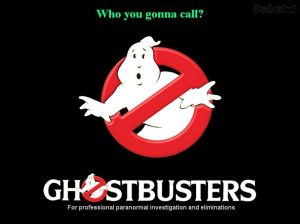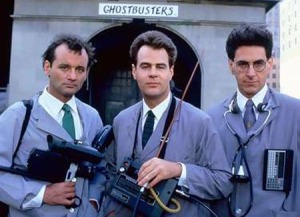In this recession hit cesspool that we wade through today, times are hard for the small businessperson. We often hark back to the glory days in the mid eighties when the the self-employed were kings among men, mass unemployment provided cheap labour and the national minimum wage was only the stuff of a communist’s dream. This was the age of the yuppie, the brickish mobile phone, the tape-loading home computer and, of course, the Ghostbusters: men who knew all too well what small business implementation meant.
The founders of the Ghostbusters (Drs Spengler, Stantz and Venkman) were firmly ensconced in the academic gravy train before being made redundant due to the perceived lack of moral and financial viability of their research. With no funding and only their ideas, as well as some purloined laboratory equipment, these three, instead of going cap-in-hand to the unemployment office, used their bold initiative and set up their own small business: Ghostbusters.
At first they only had an idea that they genuinely believed in: a paranormal reconnaissance and disposal service. With little or no market research, they collectively decided to risk Dr Stantz’s home, taking out a triple mortgage secured against the property in order to procure some fixed assets. A high risk strategy that they staked against their service being exclusive to their chosen market.
Their first task was to search and snare business premises, wisely choosing one of the less salubrious areas of Manhattan for a property search. This resulted in their finding a ramshackle former fire station with a high level of interior and exterior maintenance requirements. Both criteria ensured initial start up costs were kept to a minimum while being able to stay within their target audience in the heart of New York City and the Tri-state Area.
Now with a work space, the three pioneers soon divided the labour: Dr Spengler became head of research and development, ensuring their tools of the trade were operational as soon as possible; Dr Stantz procured more fixed assets, including a reasonably priced used vehicle, undertaking the maintenance work himself to slash costs; Dr Venkman became the human face of the organisation, encouraging his partners with humour and constructive criticism. A receptionist/secretary was hired in the form of Janine Melnitz, who with her New Yorker savvy and no nonsense attitude, was a great find in an already saturated job market. A strong branding exercise in the form of a striking logo and accompanying song was soon incorporated into the business, which awaited its first customers.
After an initial slow period, as expected in any new business, the work soon trickled in, starting with just one customer, Ms Dana Barrett, with a seemingly small complaint, one which our intrepid entrepreneurs could easily handle. From then, possibly by word of mouth in the spirit world (or syndicated television advertising) their turnover increased exponentially. For the initial contracts with large corporations, including luxury hotels, they were able to charge higher fees being the only ghostbusting service within that area. Having a sliding scale of prices also meant that the ordinary customer was not priced out of the market, gaining them popularity with the bottom end of the demographic.
Additional labour was soon acquired in hiring Winston Zeddmore, with a strong work ethic based on monetary reward, and a brutal honesty in admitting that if the paycheck were right, he would believe in anything. Winston fitted in well with the other founders in providing a neutral sounding board and an additional common sense attitude in tandem with Dr Venkman.
Even with four operatives, three being executive board members, the unpredictabilty of working with the paranormal took its toll. The Environmental Protection Agency intervened causing an administrative as well as cataclysmic headache for the Ghostbusters and the city in general. After arrest, interrogation and incarceration, the exclusivity of the Ghostbusters’ business shone through and after a no nonsense meeting with the mayor, they were free to tackle the crisis at hand.
And so the Ghostbusters saw themselves go from disgraced academics to small business entrepreneurs to city saviours. With the right combination of ideas, talent and a previously untapped market, you too could become as successful. Just remember to never cross the streams of business and interpersonal relationships unless there is no other choice.
***
[In my next essay “Ghostbusters II: What went wrong?” I will outline the errors in the Ghostbusters’ taxing and liability insurance strategies and how ultimately they managed to regain a foothold in a recession-riddled and cynical market.]



